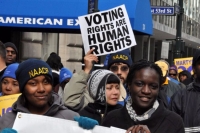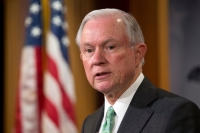McLean is one of more than 58,000 homeless college students in America today, according to Free Application for Federal Student Aid data from the 2012-2013 academic year. The figure -- which does not account for students who either do not realize they qualify as homeless (i.e., couch-surfers) or those who choose not to report their cases out of fear or shame -- marks a more than 75 percent increase over the previous three years. Administrators and poverty advocates nationwide attribute the recent spike in homelessness among college students to several leading factors: a parent losing a job, a lack of affordable housing and rising tuition costs.
Unlike the homeless population at large, homeless college students are largely indistinguishable from their peers. Many live out of their cars. Some spend nights in the school library pretending they fell asleep studying; others couch-surf at friends' houses. The rest shack up on the streets or in shelters or motels.
McLean found himself in the latter group last fall. His mother was no longer able to work after taking custody of her infant granddaughter in 2012, and McLean's part-time job as a maintenance assistant at a school for students with special needs became their primary source of income. They were evicted from their home in September 2013 after falling behind on rent. The state Department of Housing and Community Development placed McLean, his mother and his 2-year-old niece at the Bedford Plaza Hotel in Bedford, Mass., which operates as a family shelter.
McLean's counselor at UMass Boston, Shirley Fan-Chan, is the director of U-ACCESS, a college support center for disadvantaged students, which provides free meals and guidance on financial aid, among other resources. Fan-Chan has worked with roughly 60 homeless or nearly homeless students at UMass in the past year.
Due to misperceptions, Fan-Chan says, homeless students in higher education lead "double lives." Indeed, the stigmas associated with homelessness lead the majority to hide their living situations from their peers. Many resist financial aid out of pride, while others do not qualify because they are undocumented, lack a co-signer or have bad credit.
"They're embarrassed, they're afraid and they don't want people to look at them like they're waiting for the free handout," Fan-Chan said.
They're also uniquely motivated to succeed.
"These are people who get it," said Kathleen O'Neill, who directs Single Stop USA for Massachusetts' Bunker Hill Community College. The national nonprofit organization assists low-income families. "The way out of poverty is education and they are committed to doing whatever it is they need to do to get there."
Twenty-four-year-old Stephanie, who requested her last name not be used, is a dean's list student entering her senior year at UMass and a mother of two. Stephanie and her family lost their home in 2011 after falling behind on payments, and the state placed them in a motel in Brighton.
"Only 2 percent of teen mothers graduate college -- I refuse to be that 98 percent," she said. "There is just no way I'm going to be able to afford rent without a college degree. It's the only way I'm going to be able to compete for a job with a family sustaining wage."
McLean also views college as his ticket to a stable life. "I don't want to be a millionaire," he insisted. "I want to be known as the person who never made his family stress about having money."
In the meantime, he keeps his living situation hidden from his school friends and professors. He has to catch a bus home by 6:30 p.m. every day, limiting his ability to make plans with friends, attend on-campus events, or even meet his classmates to work on group projects. The shelter's 10 p.m. curfew adds another barrier to socializing. But McLean says he's most responsible for alienating himself.
"I don't want to be around people," he said, "if for any reason because eventually I'm going to have to tell them what's going on. I don't know where I get it from, but I do have a lot of pride."
Stephanie's friends, and most of her family, are not aware she is homeless either.
"Who wants to walk around telling people they're homeless?" she asked. "I will probably take it to the grave with me."
For most people in her situation, Stephanie's question is a no-brainer: Why broadcast a label that you're looking to shirk as soon as possible?
A majority of homeless college students come from lower-middle-class families and do not have a history of homelessness or extreme poverty. Many were severely affected by the 2008 recession -- a parent lost a job and was then unable to assist the student in paying for tuition or housing. Almost all were not homeless before they started school, and would not be now if they had opted for full-time jobs over college.
"People think this is the population that is stuck in a situation because they have drugs problems or they're lazy," Fan-Chan said. "But the only issue they have is that they're poor."
Interviews for this piece were conducted in May 2014.
Link to original article from The Huffington Post




 Imagine going to the polls on Election Day and discovering that your ballot could be collected and reviewed by the
Imagine going to the polls on Election Day and discovering that your ballot could be collected and reviewed by the ACLU Blueprints Offer Vision to Cut US Incarceration Rate in Half by Prioritizing 'People Over Prisons'
ACLU Blueprints Offer Vision to Cut US Incarceration Rate in Half by Prioritizing 'People Over Prisons'  "These disasters drag into the light exactly who is already being thrown away," notes Naomi Klein
"These disasters drag into the light exactly who is already being thrown away," notes Naomi Klein  How about some good news? Kansas Democratic Representative advances bill for Native Peoples.
How about some good news? Kansas Democratic Representative advances bill for Native Peoples.  What mattered was that he showed up — that he put himself in front of the people whose opinions on
What mattered was that he showed up — that he put himself in front of the people whose opinions on On a night of Democratic victories, one of the most significant wins came in Virginia, where the party held onto
On a night of Democratic victories, one of the most significant wins came in Virginia, where the party held onto A seismic political battle that could send shockwaves all the way to the White House was launched last week in
A seismic political battle that could send shockwaves all the way to the White House was launched last week in In an interview with Reuters conducted a month after he took office, Donald Trump asserted that the U.S. had “fallen
In an interview with Reuters conducted a month after he took office, Donald Trump asserted that the U.S. had “fallen Attorney General Jeff Sessions overturned the sweeping criminal charging policy of former attorney general Eric H. Holder Jr. and directed
Attorney General Jeff Sessions overturned the sweeping criminal charging policy of former attorney general Eric H. Holder Jr. and directed